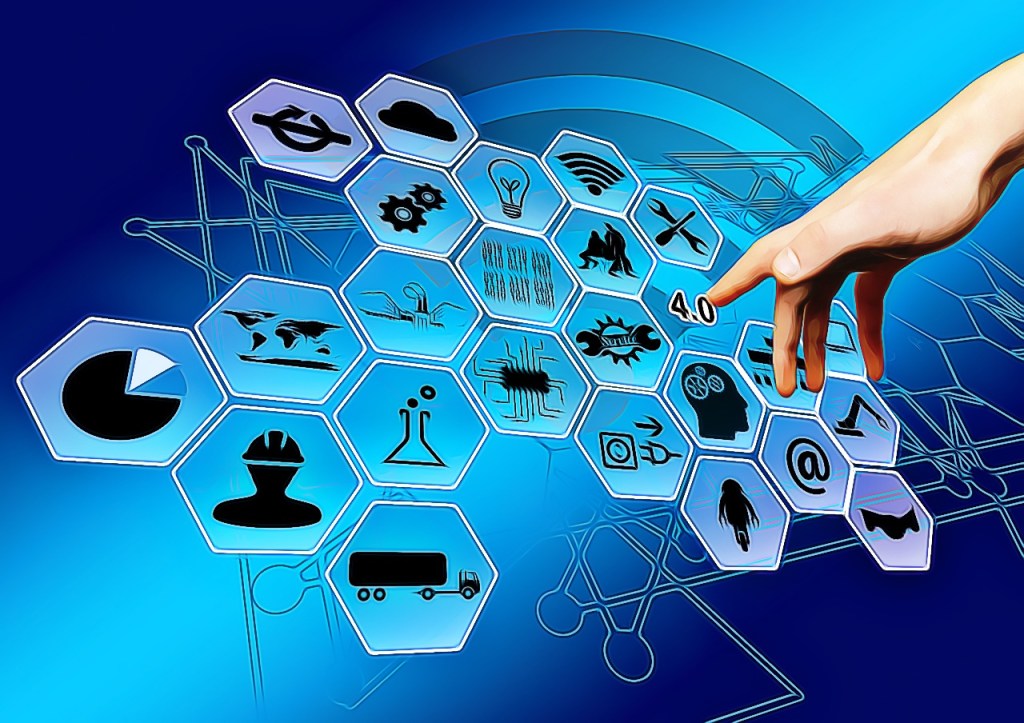Florida is quickly becoming a hotbed of technological innovation, with Miami at the forefront of this rapidly growing sector. From advancements in artificial intelligence and virtual reality to cutting-edge developments in healthcare technology, Florida is paving the way for the future. Stay up-to-date with the latest technology trends coming out of the Sunshine State in this comprehensive article.

Cybersecurity Trends
Growing importance of cybersecurity in Florida
Florida is experiencing a significant growth in the importance of cybersecurity. As more and more businesses and organizations in the state rely on technology for their day-to-day operations, the need for robust cybersecurity measures has become paramount. Cyber threats are no longer limited to just large corporations; small businesses and individuals are also being targeted. This rising concern has led to an increased demand for cybersecurity professionals and services throughout the state.
Emerging technologies in cybersecurity
In response to the growing cyber threats, Florida is also witnessing the emergence of new technologies in the field of cybersecurity. Artificial intelligence (AI), machine learning, and data analytics are being incorporated into cybersecurity tools and solutions to detect and prevent cyber attacks. These technologies enhance the ability to identify patterns and anomalies in network traffic, enabling quicker responses to potential threats. Additionally, the adoption of automation and intelligent algorithms in cybersecurity is streamlining a previously time-consuming and manual process.
Cyber threats faced by Florida businesses
Florida businesses, regardless of their size, are constantly under threat from cybercriminals. With the increase in remote work and reliance on technology, the risks have only escalated. Phishing attacks, ransomware, and data breaches are some of the most prevalent cyber threats faced by businesses in the state. The healthcare and financial sectors, in particular, are attractive targets due to the sensitive nature of the data they handle. To mitigate these threats, it is crucial for businesses in Florida to invest in robust cybersecurity measures and stay up to date with the latest security practices.
Artificial Intelligence (AI) in Florida
Adoption of AI technologies in Florida
AI technologies are rapidly being adopted across various industries in Florida. From healthcare to finance, AI has the potential to revolutionize processes and improve efficiency. In the healthcare sector, AI is being utilized for medical imaging analysis, drug discovery, and personalized medicine. The finance industry is leveraging AI for fraud detection, risk assessment, and algorithmic trading. Moreover, AI-powered chatbots are becoming increasingly common in customer service, providing instant support and reducing the need for human intervention.
Impacts of AI on Florida industries
The adoption of AI technologies is expected to have a significant impact on Florida industries. Increased automation and improved decision-making capabilities driven by AI are likely to enhance productivity and streamline operations. For example, AI-powered predictive analytics can help businesses make data-driven decisions, improving business outcomes and resource allocation. Additionally, AI has the potential to foster innovation and create new job opportunities in emerging fields such as robotics and autonomous systems.
Investments in AI startups in Florida
Florida is also witnessing a surge in investments in AI startups. Venture capitalists and angel investors recognize the potential of AI technologies and are actively seeking opportunities to fund promising startups. This influx of capital allows AI startups to develop and commercialize innovative solutions, helping drive economic growth in the state. With a supportive ecosystem and a growing talent pool, Florida is poised to become a hub for AI innovation and entrepreneurship.
Blockchain Developments
Adoption of blockchain technology in Florida
Blockchain technology is gaining traction across various sectors in Florida. Its decentralized and immutable nature offers enhanced security and transparency, making it suitable for applications in finance, supply chain, and government services. In the financial industry, blockchain has the potential to streamline payments, reduce fraud, and improve regulatory compliance. Additionally, blockchain-based platforms are being developed to create digital identities, streamline voting processes, and facilitate secure peer-to-peer transactions.
Blockchain initiatives in government and finance sectors
The Florida government has recognized the potential of blockchain technology and is actively exploring its applications. Initiatives are underway to digitize government services, improve transparency, and enhance cybersecurity through blockchain. Additionally, the finance sector is exploring the use of blockchain for digitizing asset management, ensuring transparent transactions, and reducing costs associated with intermediaries. By embracing blockchain technology, Florida is positioning itself as a leader in the adoption of decentralized and secure digital systems.
Potential use cases of blockchain in Florida
Blockchain technology has the potential to revolutionize several industries in Florida. In the real estate sector, blockchain-enabled platforms can streamline property transactions, ensuring transparency and reducing fraud. Supply chain management can benefit from blockchain by providing a reliable and immutable record of the movement of goods, enhancing traceability and reducing counterfeiting. Additionally, blockchain-based solutions can be leveraged in healthcare to secure medical records, enable interoperability, and facilitate secure sharing of patient data. Florida’s diverse industry landscape opens up numerous opportunities for the application of blockchain technology.
5G Implementation
Rollout of 5G networks in Florida
Florida is at the forefront of the 5G revolution, with major telecommunications companies rolling out 5G networks across the state. 5G, the fifth generation of wireless technology, promises significantly faster download and upload speeds, lower latency, and increased device capacity. This has far-reaching implications for various industries, including healthcare, transportation, and entertainment. Cities such as Miami, Orlando, and Tampa are witnessing the rapid deployment of 5G infrastructure, paving the way for transformative technological advancements.
Benefits and challenges of 5G in Florida
The implementation of 5G in Florida offers several benefits. It will revolutionize the way we consume media, enabling ultra-high-definition streaming and immersive augmented reality experiences. Additionally, 5G will greatly enhance telecommunication networks, enabling improved connectivity and faster response times. However, the widespread implementation of 5G also presents challenges. The deployment of infrastructure, such as small cell sites and fiber-optic cables, needs to be planned strategically to ensure comprehensive coverage. Moreover, concerns regarding security and privacy need to be addressed to mitigate potential vulnerabilities posed by the increased connectivity.
Impacts on various industries in Florida
The implementation of 5G networks has the potential to transform various industries in Florida. In the healthcare sector, 5G can enable remote patient monitoring, telemedicine, and real-time data exchange between healthcare providers. This enhances patient care, reduces costs, and improves healthcare outcomes. The transportation industry can benefit from 5G by enabling connected and autonomous vehicles, improving traffic management, and enhancing safety. Furthermore, the entertainment industry can leverage 5G technology to deliver immersive experiences, such as virtual reality gaming and live-streamed events.

Healthcare Technology Advancements
Digitalization of healthcare in Florida
Technology is revolutionizing the healthcare industry in Florida, driving digitalization and improving patient care. Electronic health records (EHRs) have replaced paper-based systems, allowing healthcare providers to securely access and share patient information. This digitalization of healthcare records enhances efficiency, reduces errors, and improves the overall quality of healthcare services. Moreover, wearable devices and mobile health applications are empowering individuals to take control of their health and monitor vital signs in real-time.
Telehealth services and virtual care platforms
Florida has witnessed a rapid expansion of telehealth services and virtual care platforms, especially in the wake of the COVID-19 pandemic. Telehealth allows patients to receive medical consultations remotely, reducing the need for in-person visits and improving access to healthcare services. Virtual care platforms enable physicians to diagnose and treat patients through video consultations, providing convenience and flexibility. These advancements in telehealth and virtual care have the potential to bridge healthcare accessibility gaps, particularly in rural areas.
AI and machine learning in healthcare diagnosis
AI and machine learning technologies are transforming healthcare diagnosis in Florida. These technologies analyze large datasets, identify trends and patterns, and assist healthcare professionals in making accurate and timely diagnoses. AI-powered algorithms can interpret medical images, detect abnormalities, and aid in the early detection of diseases, leading to improved patient outcomes. Machine learning can also predict disease progression, identify high-risk patients, and assist in personalized treatment plans. The integration of AI and machine learning in healthcare has the potential to accelerate medical advancements and enhance patient care in Florida.
E-commerce Innovations
Growth of e-commerce market in Florida
The e-commerce market in Florida is experiencing tremendous growth, fueled by the widespread adoption of online shopping. Consumers are increasingly turning to e-commerce platforms to purchase products and services, driven by convenience, competitive pricing, and a wider range of choices. The COVID-19 pandemic further accelerated this trend as people turned to online shopping to meet their needs while adhering to social distancing measures. As a result, businesses in Florida are investing in e-commerce infrastructure and digital marketing strategies to capitalize on this growing market.
Technological advancements in online shopping
Technological advancements are reshaping the landscape of online shopping in Florida. Augmented reality (AR) and virtual reality (VR) technologies are being incorporated into e-commerce platforms, allowing consumers to visualize products before making a purchase. AI-powered chatbots and virtual assistants enhance the online shopping experience by providing personalized recommendations and assisting with customer queries. Furthermore, secure payment gateways, advanced fraud detection algorithms, and real-time tracking systems ensure a safe and seamless online shopping experience for consumers in Florida.
Logistics and delivery solutions
Efficient logistics and delivery solutions are crucial for the success of e-commerce in Florida. With the growth of online shopping, the demand for fast and reliable delivery services has increased. As a result, logistics companies are leveraging technology to optimize supply chain management, automate processes, and enhance tracking capabilities. Advanced route optimization algorithms and real-time tracking systems ensure timely deliveries, improving customer satisfaction. Additionally, innovative solutions such as drones and autonomous vehicles are being explored to further streamline the last-mile delivery process.

Smart Cities and IoT
Development of smart city initiatives in Florida
Florida cities are embracing smart city initiatives, integrating technology to enhance quality of life, improve sustainability, and optimize urban services. Smart city projects focus on leveraging data, connectivity, and automation to create efficient and responsive urban environments. Florida cities such as Miami, Orlando, and Tampa are implementing intelligent transportation systems, connected streetlights, and smart waste management solutions. These initiatives aim to improve traffic management, conserve resources, and create a more sustainable and livable future for residents.
IoT integration in transportation and infrastructure
The Internet of Things (IoT) is playing a crucial role in transforming transportation and infrastructure in Florida. IoT devices, such as sensors and cameras, are being integrated into transportation systems to collect real-time data on traffic flow, parking availability, and public transit usage. This data-driven approach enables smarter decision-making, reduces congestion, and improves transportation efficiency. Furthermore, IoT is being utilized to monitor the condition of critical infrastructure, such as bridges and utilities, enabling predictive maintenance and enhancing public safety.
Smart grid and energy management
Smart grid technology is revolutionizing energy management in Florida’s cities. By integrating advanced sensors, automation, and AI algorithms, the smart grid optimizes the distribution of electricity, improves reliability, and enables more efficient energy usage. Smart meters allow residents to monitor their energy consumption in real-time, encouraging more conscientious energy use. Additionally, the smart grid facilitates the integration of renewable energy sources, such as solar and wind, into the existing energy infrastructure, creating a more sustainable and resilient energy system in Florida.
Renewable Energy Technologies
Expansion of solar and wind energy in Florida
Florida is making significant progress in expanding its renewable energy capacity, particularly in solar and wind energy. The abundant sunshine and favorable weather conditions make Florida an ideal location for solar energy generation. Large-scale solar farms and rooftop solar installations are becoming increasingly common throughout the state. Wind energy is also gaining traction, especially in coastal areas where wind resources are abundant. The expansion of renewable energy in Florida is reducing dependence on fossil fuels, lowering greenhouse gas emissions, and contributing to a cleaner and more sustainable energy future.
Innovation in energy storage solutions
To maximize the potential of renewable energy sources, innovative energy storage solutions are essential. Florida is witnessing advancements in energy storage technologies that enable the efficient capture and utilization of renewable energy. Battery storage systems, such as lithium-ion batteries, are being implemented to store excess energy generated by solar and wind installations. This stored energy can be utilized during times of high demand or when renewable energy generation is intermittent. These energy storage solutions ensure a reliable and consistent energy supply while reducing the reliance on traditional power grids.
Smart home energy management systems
Smart home energy management systems are gaining popularity in Florida, allowing residents to optimize energy usage and reduce utility bills. These systems integrate smart devices, such as thermostats, lighting controls, and smart appliances, to monitor and regulate energy consumption. AI algorithms analyze energy usage patterns and make recommendations for energy-efficient behaviors, enabling homeowners to make informed decisions about their energy consumption. By empowering residents to actively manage their energy usage, smart home energy management systems contribute to energy conservation efforts and help create a more sustainable future.

Educational Technology
Integration of technology in Florida schools
Education in Florida is embracing technology to enhance learning experiences and prepare students for a technology-driven future. Schools across the state are integrating innovative technologies such as interactive whiteboards, tablets, and online learning platforms into their curriculum. This technology-driven approach promotes engagement, collaboration, and personalized learning. By equipping students with digital skills and access to educational resources, Florida schools are empowering the next generation to thrive in an increasingly digital world.
Online learning platforms and virtual classrooms
Online learning platforms and virtual classrooms have gained significant prominence in Florida, especially during the COVID-19 pandemic. These platforms provide access to a wide range of educational resources and enable students to learn remotely, ensuring continuity of education. Virtual classrooms facilitate interactive discussions, assignments, and assessments, creating an engaging learning environment. Moreover, online learning platforms offer flexibility, allowing students to learn at their own pace and access educational materials anytime, anywhere.
EdTech startups and initiatives
Florida’s education technology (EdTech) sector is witnessing a surge in startups and initiatives aimed at transforming education through technology. EdTech startups are developing innovative solutions ranging from online tutoring platforms to immersive educational content. Venture capital firms and educational institutions are investing in these startups, recognizing the potential of technology to improve learning outcomes. Furthermore, collaborations between schools and EdTech companies foster innovation, enabling the development and implementation of cutting-edge educational technologies in Florida’s classrooms.
Space Exploration
NASA’s presence in Florida
Florida has a rich history in space exploration, primarily due to the presence of NASA’s Kennedy Space Center. The Kennedy Space Center serves as the primary launch site for NASA missions, including human spaceflight and scientific exploration. This iconic facility has witnessed numerous historic events, such as the Apollo moon missions and the space shuttle program. Florida’s proximity to the equator provides favorable launch conditions, making it an ideal location for space exploration endeavors.
Private space companies operating in Florida
In addition to NASA, several private space companies have established a presence in Florida. SpaceX, founded by entrepreneur Elon Musk, operates from Cape Canaveral Spaceport and conducts regular launches of its Falcon rockets and Crew Dragon spacecraft. Blue Origin, founded by Amazon CEO Jeff Bezos, is also operating in Florida and developing reusable rockets for commercial space travel. The presence of private space companies in Florida contributes to the overall growth and advancement of the space industry in the state.
Advancements in space technology
Florida’s space industry is witnessing advancements in space technology that are pushing the boundaries of exploration and innovation. The development of reusable rockets by private companies is revolutionizing space travel and reducing the cost of accessing space. Additionally, Florida’s spaceport facilities are adapting to accommodate new types of spacecraft, such as SpaceX’s Starship, which has the potential to transport humans and cargo to destinations beyond Earth’s orbit. Advancements in space technology in Florida are paving the way for new frontiers in scientific research, commercial space travel, and extraterrestrial exploration.
In conclusion, Florida is at the forefront of technology trends, experiencing significant growth in cybersecurity, AI adoption, blockchain developments, 5G implementation, healthcare technology, e-commerce innovations, smart cities, renewable energy, educational technology, and space exploration. These advancements are transforming industries, enhancing efficiency, and improving the overall quality of life for residents in the Sunshine State. As technology continues to evolve, Florida remains a hub of innovation, fostering entrepreneurship, and spearheading technological advancements that shape the future.
